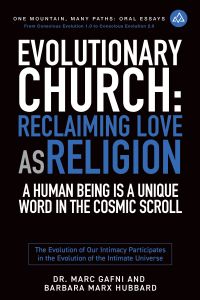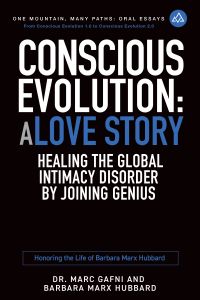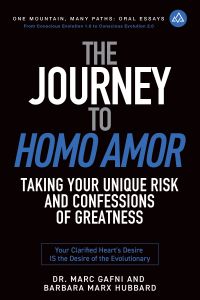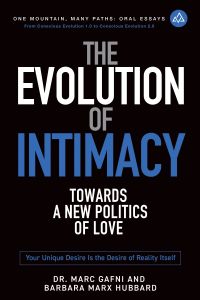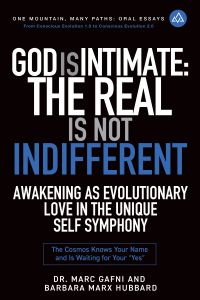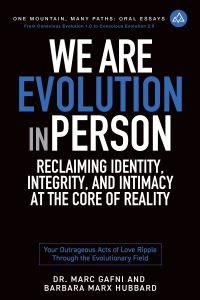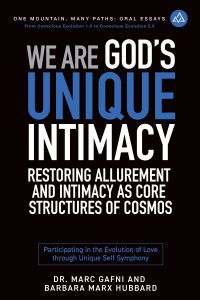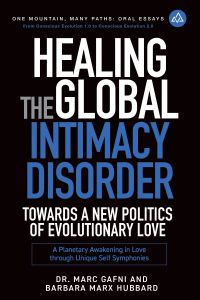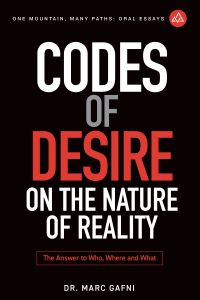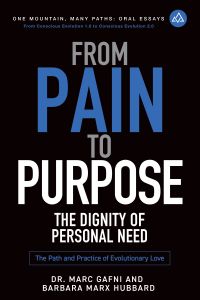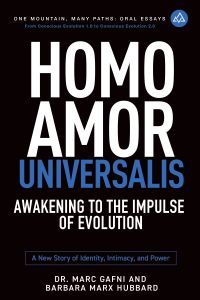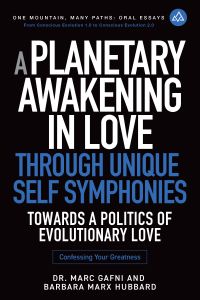Homo Amor and Unique Self | One Mountain Oral Essays | Dr. Marc Gafni
Homo Amor and Unique Self: A Revolutionary Path Towards a Planetary Awakening In Love Through Unique Self Symphonies
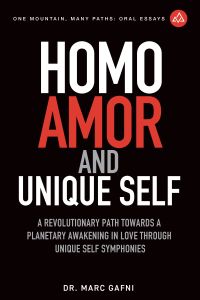
Published by World Philosophy and Religion Press in conjunction with Integral Wisdom Publishers.
Book details:
Title: Homo Amor and Unique Self: A Revolutionary Path Towards a Planetary Awakening In Love Through Unique Self SymphoniesAuthor: Dr. Marc Gafni
Series: Oral Essay Series – Volume 22
Publisher: World Philosophy and Religion Press in conjunction with Integral Wisdom Publishers.
ISBN-13: 979-8888340318
Formats: Paperback, e-book, audiobook.
Table of Contents
CHAPTER 1 THE PUZZLE PIECE DHARMA AND THE FIVE SELVES
- A Collective Human Intelligence In Unique Self Symphony Is The Only Force More Intelligent Than Artificial Intelligence
- Evolutionary Love Code: The Field Of Intimacy And Desire Is Seamless But Not Featureless
- We Get To Fall Madly In Love With Each Other
- Reclaiming A Politics Of Love
- God, Can I Bring Everything To You?
- Planetary Awakening In Love Through Unique Self Symphony
- Authentic Intelligence: A Conscious Intention By Each Of Us To Give Our Unique Gift
- The dharma Of The Five Selves
- Planting The dharma In Politics, Science, Religion, Justice, Government And Relationships
CHAPTER 2 TAKE YOUR UNIQUE RISK—GIVING UP BEING RIGHT
- Stepping Up As The Community Of God Selves
- Prayer: Pulsing Desire Merged With Quivering Tenderness
- Evolutionary Love Code: In Order To Commit My Outrageous Act Of Love, I Must Take My Unique Risk
- My Unique Risk Is, I’ve Got To Put All Of Myself On The Line, And I Don’t Know Exactly How It’s Going To Go
- The Unique Risk Of The Infinity Of Intimacy
- No One Will Call You Out For Not Taking Your Unique Risk
- How To Take Your Unique Risk: You Put Everything On The Line
- We Are God In Evolution And We Are At A Shift Point Of Evolution
CHAPTER 3 CLARIFYING YOUR HEART’S DESIRE
- We Can All Be Prophets Of The New Word, But We Must Be Committed
- We Are A Training School For Prophets
- In Prayer, We Invoke. In Prophesy, God Invokes
- Evolutionary Love Code: We’re Accountable In Life For This Question: Did You Take Your Unique Risk?
- The Wheel Of Co-Creation 2.0
CHAPTER 4 EVERY PLACE I’VE BEEN I NEEDED TO BE
- The New Story: I’m A Unique Configuration Of Evolutionary Love
- Evolutionary Love Code: Every Place You’ve Been You Needed To Be
- Prayer: The Realization That The Field Of Intelligence Is Holding Me
- Every Place I’ve Been, I Needed To Be
- The Self-Actualizing Cosmos That Moves Us Is The Evolution Of Intimacy
- I Am God’s Evolutionary Partner
- We Are Allured To Play Our Part In The Self-Organizing Universe
- Making My Contribution To The Unique Self Symphony
CHAPTER 5 CONFESS YOUR BROKENNESS; CONFESS YOUR GREATNESS
- Telling A New Story: Human Beings Participate In Divinity
- Modernity: The Win/Lose Success Story
- Confessing Our Collective Vulnerability
- Unique Self Symphonies: Human Beings Looking At Each Other From Their Place Of Vulnerability
- From That Place Of Vulnerability, We Confess Our Greatness
- Evolutionary Love Code: The Only Slave-driver In The World Is That Yesterday Determines Today
- My Brokenness And My Greatness Are Not Separate In Any Way
- Accessing The Newness Of Homo Amor Universalis
CHAPTER 6 MY UNIQUE TRANSFORMATION TRANSFORMS EVERYTHING
- Are You Willing To Play A Larger Game? Are You Ready To Participate In The Evolution Of Love?
- We’re In A Da Vinci Moment: We Need To Upgrade The Source Code
- Prayer: God Is The Infinite Personhood Of Cosmos
- Evolutionary Love Code: Reality Is Driven By Eros
- Transformation Is The Highest Pleasure
- My Transformation Transforms Everything Because Reality Lives In Me
- That Which Is Above Comes From You
- I Am The More God To Come
CHAPTER 7 LOVING THE MOMENT OPEN: A NEW VISION OF UNIQUE SELF SYMPHONY
- Joining Genius In Unique Self Symphonies To Tell A New Story
- Coming Together As A Band Of Outrageous Lovers To Love The Moment Open
- Prayer: A Heart-Orgy With The Infinity Of Power And The Infinity Of Intimacy
- Evolutionary Love Code: The Highest Pleasure Is Transformation,
- And The Transformation Is The Highest Form Of Power
- Feel A Unique Transformation That’s Uniquely Personal As You
- The Highest Pleasure Is Transformation And The Highest Transformation Is Power
CHAPTER 8 THE TAO THAT CAN BE CODED IS NOT THE TAO: EVOLVING HUMANITY BEYOND ALGORITHMS
- Telling a New Story Rooted in Eternal and Evolving Values
- Evolutionary Love Code: To Think We Have Stepped Out of the Tao Is the Greatest Existential Risk of All
- The Tao That Can Be Spoken Is Not the Tao
- The Death of Our Humanity Begins When We Think We’ve Stepped Out of the Tao
CHAPTER 9 YOUR HOLY AND YOUR BROKEN ARE BOTH HALLELUJAH: BEING THE NEW HUMAN IN THE TAO
- We Are a Unique Self Symphony, an Emergent Expression of the Tao
- The Unique Self Symphony in Response to the Tech Plex
- Imagine a Unique Self Facebook With 7.7 Billion Users Joining Together in Symphony
- Evolutionary Love Code: The Eternal Tao Is the Evolving Tao
- Love Is Both Eternal and It Evolves
- The Tao Is the Realization of the Unquantifiable Value of a Human Being
- There’s a Shattering in Everything That Reality Has Made—That’s How the Light Gets in
- Reshimu: Traces of Transcendence
CHAPTER 10 EVOLUTION IS PERSONAL: A SCIENTIFIC TRUTH
- We Are Evolution in Person
- Re-reading Neurochemistry as an Expression of the Intimate Universe
- In Prayer We Turn to the Infinity of Intimacy That Knows Our Name
- The Internet Is the Shallows, the Clarified Heart-Mind Expresses Depth
CHAPTER 11 THE ARC OF THE INTIMATE UNIVERSE BENDS TOWARD EVOLUTIONARY UNIQUE SELF
- Reality Moves Towards More Intimacy, Wholeness, Aliveness, Depth, Ecstasy, and Kindness
- The Principles of Revolution: Telling the New Story
- All of Reality Is Intimate, All the Way Up and All the Way Down
- The Internet Must Be Recoded From “The Shallows” to Depth and Intimacy
- Who Am I? The Separate-Self Narrative
- Who Am I? The Social-Self Narrative
- Who Am I? The Unique-Self Narrative
- Social Self: Rats in the Maze of the Tech Plex
- Unique Self as Part of a Symphony
CHAPTER 12 THE GOOD NEWS: HOMO AMOR, WE ARE ALL NEEDED
- The Dangers of Inaccurate, Partial Stories
- Reclaiming the Evangelical Spark That Has Been Hijacked
- To Be an Evangelist Is to Be an Outrageous Lover
- Outrageous Love: We’re Outraged
- Evolutionary Love Code: For True Evangelism We Need Both Ecstatic States and Developmental Stages
- In Every Great Tradition There’s an Intimate Incarnation of the Divine
- Passover: Reclaiming the Broken Part
CHAPTER 13 THE DIVINE DELIGHT AND DEVASTATION OF DEVOTION AND HER DIGNITIES: VISIONS OF UNIQUE SELF AND UNIQUE SELF SYMPHONY
- You Cannot Live In Joy Without Being In Devotion
- Anna Akhmatova As A Symbol Of Devotion: Where Catastrophe Led Them, I Was There
- Evolutionary Love Code: The Evolution Of Desire Is The Evolution Of Devotion
- Devotion Is An Expression Of The Depth Of Desire
- Devotion In Premodernity, Modernity And Postmodernity
- We Need To Deconstruct Devotion In Order To Resurrect It
- Devotion Is The Placing Of Attention
- I Want To Place My Attention On My Allurement
- Devotion Beyond Unique Self
- I’m Your Man
About the Authors:
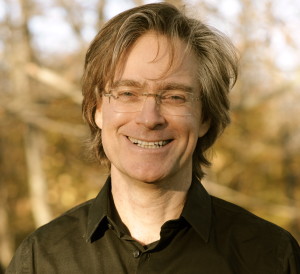 Dr. Marc Gafni is a leading public intellectual and teacher impacting the source code of global culture.
Dr. Marc Gafni is a leading public intellectual and teacher impacting the source code of global culture.
Gafni is a visionary thinker, social activist and passionate philosopher. He is known for his “source code teachings”, including Unique Self theory and the Five Selves, the Amorous Cosmos, A Politics of Evolutionary Love, A Return to Eros and Digital Intimacy.
He is author of twenty five books, of which the first ten have been published, including the award-winning Your Unique Self: The Radical Path to Personal Enlightenment.
He holds his doctorate in philosophy from Oxford University, as well as Orthodox rabbinic ordination.
He teaches on the cutting edge of philosophy in the West, helping to evolve a new ‘dharma’ or meta-theory of Integral meaning that is helping to re-shape key pivoting points in global consciousness and culture, with the aim of participating in the articulation of what Dr. Gafni together with Dr. Zak Stein and colleagues are calling CosmoErotic Humanism.
At the core of CosmoErotic Humanism is what Dr. Gafni and Dr. Stein are calling ‘First Principles and First Values’, Anthro-Ontology and a “Universal Grammar of Value”.
This is the ground of a new shared universe story and a new narrative of identity for the new human and the new humanity. This is what they are calling the emergence from Homo sapiens to Homo Amor.
This shared story rooted in First Principles and First Values can then serve as the matrix for a global ethos for a global civilization.
Gafni is considered by many to be a kind of Einstein of Philosophy who is leading a team of thinkers articulating a new vision of meaning for the world.
Dr. Gafni is the Co-Founder together with Ken Wilber and Sally Kempton of the Center for World Philosophy and Religion where he serves as its co-president. Together with Dr. Zak Stein, they are co-leading a team of thinkers, articulating a new vision of meaning for the world.
In 2014 Dr. Gafni co-initiated the Success 3.0 Summit and Rise Up movie, whose method and movement is to bring together key thought leaders and change-agents to collaboratively evolve a bold new Integral vision of Success, rooted in the entrepreneurial values of Wake Up, Grow Up, Show Up, and Outrageous Love.
Over the past 30 years, Dr. Gafni has developed evolutionary and activist programs rooted in his commitment to what he has termed “participating in the evolution of love.” Together with author and social innovator Barbara Marx Hubbard, he is working on a series of new works revolving around Evolutionary Spirituality.
Explore more:
Explore the Great Library:
Center for World Philosophy & Religion – Oral Essay Series → https://worldphilosophyandreligion.org/books/
Learn about the full Oral Essays series:
Complete Oral Essay Series → https://worldphilosophyandreligion.org/oral-essays-series-one-mountain-marc-gafni/
Dr. Marc Gafni Official Website:
https://marcgafni.com/
Center for World Philosophy and Religion:
https://worldphilosophyandreligion.org/
Free Weekly Broadcast with Dr. Marc Gafni:
https://www.onemountainmanypaths.org/
Join the community Who We Must Become:
https://who-we-must-become-3166d4.circle.so/
Free Unique Self Mini Course:
https://www.uniqueselfinstitute.com/the-unique-self-mini-course/
Formal refutations on controversy:
WhoIsMarcGafni.com
Social Media Dr. Marc Gafni:
Substack: https://substack.com/@marcgafni
Instagram: https://www.instagram.com/marcgafni/
YouTube: https://www.youtube.com/c/MarcGafni
Facebook: https://www.facebook.com/DrMarcGafni
Twitter:https://twitter.com/MarcGafni
LinkedIn: https://www.linkedin.com/in/drmarcgafni/
TikTok: https://www.tiktok.com/@drmarcgafni

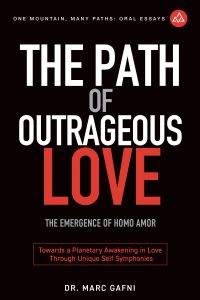
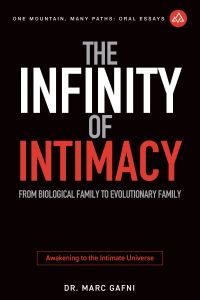
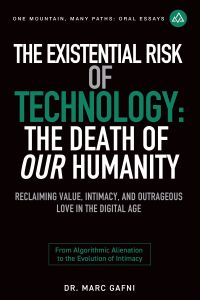
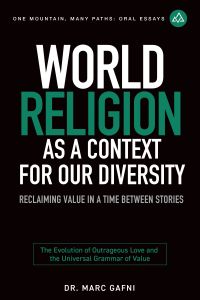
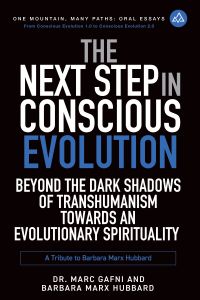
 Barbara Marx Hubbard (born Barbara Marx; December 22, 1929–April 10, 2019) was an American futurist, author, and public speaker. She is credited with the Wheel of Co-Creation and together with Dr. Gafni, the Wheel of Co-Creation 2.0, as well as the concepts of the Synergy Engine and the “birthing” of humanity.
Barbara Marx Hubbard (born Barbara Marx; December 22, 1929–April 10, 2019) was an American futurist, author, and public speaker. She is credited with the Wheel of Co-Creation and together with Dr. Gafni, the Wheel of Co-Creation 2.0, as well as the concepts of the Synergy Engine and the “birthing” of humanity.